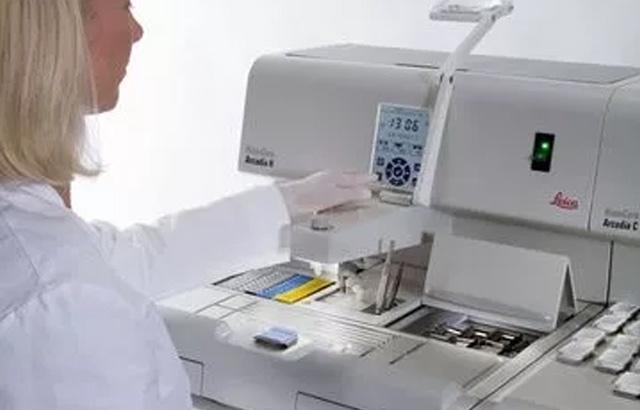
Tips for Choosing an Embedder
When choosing an embedder, three areas should be considered to maximize your purchase: Simple Operation, Smooth Workflow and Precise Control. Let’s take a look at each of these topics in more detail.
Simple Operation

First, the instrument needs to be simple to use. This includes being easy to configure - including the temperature, scheduling and timing. A touch screen with an easy-to-use interface is also important because it offers a “one-stop shop” to configure and operate the instrument. This will allow for minimal training of staff and increased productivity.
Consider the size of the paraffin tank needed in your lab. A large tank will allow for fewer paraffin refills, less melting wait time, and allow for enhanced efficiency. In addition, ergonomic & insulated wrist pads helps provide added user comfort, and protection from the temperature of the hot plate and chill of cold plate.
Smooth workflow

A smooth workflow is all about making life easier for the user, while providing higher throughput. This includes using an instrument that is easy to maintain, but also easy to clean. Be sure the instrument uses high quality material on the workspaces because removing wax from plastic surfaces can be a difficult task. An effective scraper can help you clean and maintain the surfaces of your embedder, even for those hard to clean areas.
Customizable hot plate/cold plate set up – Consider a symmetric design that allows the instrument to be configured for left or right-handed lab personnel. This provides the additional flexibility to customize your workflow.
An automatic starter for the hot plate saves time by allowing you to program the start time based on your lab schedule. Normally, it can take 2-3 hours to heat the wax to the optimal temperature. For instance, if you plan to use the embedder at 8:30 am, the automatic start will initiate the heating process at 5:00 am, allowing you to save time and maximize efficiency in the lab. An automatic starter can also provide cost savings by only using electricity while the instrument is in use, and not during idle periods.
Precise Control

A consistent surface temperature for the hot & cold plate is critical during the embedding process. Without this temperature consistency, samples could freeze at different times, impacting quality of the sample and disrupting the workflow.
An LED light gives the operator the best view of the sample. These lights are much brighter and whiter than previous bulb types, providing better visibility during sample handling. Traditional lights can create a yellow tint that can change the color of the tissue. A pure white LED light provides a more natural and realistic representation of the tissue color.
Related Content
Leica Biosystems 콘텐츠는 Leica Biosystems 웹사이트 이용 약관의 적용을 받으며, 이용 약관은 다음에서 확인할 수 있습니다. 법적고지. 라이카 바이오시스템즈 웨비나, 교육 프레젠테이션 및 관련 자료는 특별 주제 관련 일반 정보를 제공하지만 의료, 규정 또는 법률 상담으로 제공되지 않으며 해석되어서는 안 됩니다. 관점과 의견은 발표자/저자의 개인 관점과 의견이며 라이카 바이오시스템즈, 그 직원 또는 대행사의 관점이나 의견을 나타내거나 반영하지 않습니다. 제3자 자원 또는 콘텐츠에 대한 액세스를 제공하는 콘텐츠에 포함된 모든 링크는 오직 편의를 위해 제공됩니다.
모든 제품 사용에 다양한 제품 및 장치의 제품 정보 가이드, 부속 문서 및 작동 설명서를 참조해야 합니다.
Copyright © 2025 Leica Biosystems division of Leica Microsystems, Inc. and its Leica Biosystems affiliates. All rights reserved. LEICA and the Leica Logo are registered trademarks of Leica Microsystems IR GmbH.



